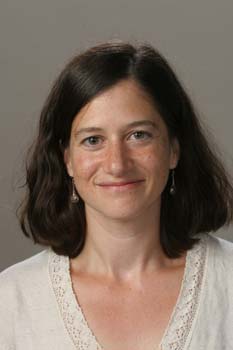Jessica Goldberg
Biography
Jessica Goldberg studies the medieval history of the Mediterranean basin, Christian Europe, and the Islamic world, specializing in economic and legal institutions and culture.
After earning an A.B. in Social Studies from Harvard University, Professor Goldberg spent several years teaching high school math, then completed a Ph.D. in the History Department at Columbia University in 2006. Before joining the UCLA faculty in 2013, Professor Goldberg taught at Stanford University and the University of Pennsylvania.
Professor Goldberg studies the medieval history of the Mediterranean basin, Latin Christendom, and the western Islamic world, specializing in economic and legal history. The main focus of her work is on the infrastructures, institutions, and cultures that govern material life, and the re-construction of geographic and socio-economic patterns of production and consumption. Additional interests include epistolographic culture, and the idea and practice of law in medieval societies. Her first book, Trade and Institutions in the Medieval Mediterranean: The Geniza Merchants and their Business World (Cambridge University Press, Studies in Economic History, 2012) explores the nature and geography of the medieval Islamic economy, the ways a group of merchants engaged with local and long-distance infrastructures and institutions of trade, and how notions of identity—religious, political, and geographic—affected the practices of business. Professor Goldberg has also written articles on the nature and use of merchant letters, on the economic activities of Jews under Islam, on the use of law, contracts, and evidence among medieval merchants in both Italy and Egypt, and on the legal persona of children in medieval canon law.
Professor Goldberg’s current work explores the nature of economic change between late antiquity and the middle Islamic period in North Africa and the Levant, especially focusing on changes in economic materiality that shifted patterns of production, transport, and consumption. This project centers around looking at new patterns of production and use of key products in these centuries in comparison to Late Antiquity, particularly in the textile and ceramic fields. Professor Goldberg is using a mixture of written sources, archeological research, and museum collections to research both the cultural norms that drove new kinds of production, investment, and technological innovation in the western Islamic ecumene, and in turn the material bases that allowed such cultural patterns to become elaborated. It is thus an attempt to reveal and document the profound re-shaping of material culture that was part of the first centuries of Islamic rule in the Mediterranean (c. 700-1100).
Professor Goldberg teaches a broad range of subject matter, including courses on medieval European history, Mediterranean economic history from antiquity through the end of the middle ages, the Jews in the medieval Islamic world, and history of Mediterranean religions. She advises graduate students in both medieval European and medieval Islamic history.
Publications
Trade and Institutions in the Medieval Mediterranean: The Geniza Merchants and their Business World (Cambridge Studies in Economic History, Cambridge University Press, August 2012).
Co-editor with Eve Krakowski, Jewish History. “Special Issue: Documentary Geniza Research in the Twenty-First Century” 32: 2-4 (2019) 464pp. Contributions include
“Editors’ Introduction,” (with Eve Krakowski) pp. 115-130.
“Mercantile Letters,” pp. 397-410.
“Lists,” 419-428.
“Writing History from the Geniza: Issues, Methodologies, Prospects,” pp. 497-523.
“Economic Activities,” in Cambridge History of Judaism, Volume 5: Jews in the Medieval Islamic World, Ackerman-Lieberman, ed. Cambridge University Press, 2021, pp. 412-449.
“The Courts, the Qadi, and the ‘People’: Resolving Mercantile Disputes in the Medieval Islamic Mediterranean,” in Conflict Management in the Mediterranean and the Atlantic, 1000-1800. Actors, Institutions and Strategies of Disputes Settlement, eds. Sicking and Wijffels. Leiden: Brill, 2020, pp. 19-42
“Choosing and Enforcing Business relationships in the Eleventh-century Mediterranean: re-examining the ‘Maghribī traders’,” Past & Present, 215 no. 2 (August 2012): 3-40
“The Use and Abuse of the Geniza Mercantile Letter,” Journal of Medieval History 38 no. 2 (2012): 127-154.
“On reading Goitein’s A Mediterranean Society: a view from economic history,” Mediterranean Historical Review 26 no. 2 (2011): 171-186. (16 pages)*
“The Legal Persona of the Child in Gratian’s Decretum,” Bulletin of Medieval Canon Law 24 (2000): 10-53.
Awards & Grants
- 2020-2021 Residential fellow, Israel Institute for Advanced Studies, Research Group: Cultural Brokerage in Pre-Modern Islam
- 2012 Charles V. Ryskamp Fellow of the American Council of Learned Societies. 2012-2015
- Theme Member, School of Social Science, Institute for Advanced Study, Princeton, NJ 2012-2013. Theme: “Economy and Politics”
- Mellon Foundation Member, School of Historical Studies, Institute for Advanced Study, Princeton, NJ, 2009-2010
- Charles Ludwig Distinguished Teaching Award, 2009, School of Arts and Sciences, University of Pennsylvania
- Fellow, Center for Advanced Judaic Studies, 2006-2007.
- Postdoctoral Fellow, Stanford Humanities Fellows Program, Stanford University, 2005-2006


